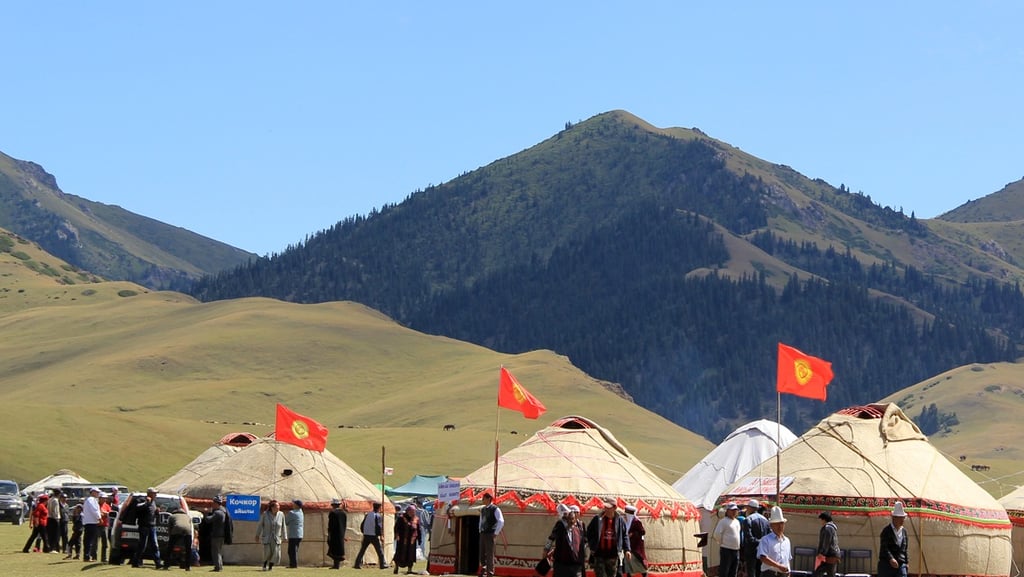Traveler’s Guide to Kyrgyzstan
Download this guide with essential information for a comfortable trip to the Kyrgyz Republic.
11/5/20244 min read


Customs Regulations
Adults are allowed to import up to 2 liters of alcoholic beverages and 200 cigarettes.
Sporting and hunting weapons may be brought into Kyrgyzstan by foreign nationals but must be declared upon entry. Additionally, the traveler must have an invitation from a legal entity licensed for hunting, a hunting contract with this entity, or an invitation to participate in sports events, along with a relevant permit from the Ministry of Internal Affairs of the Kyrgyz Republic. The declared weapon must be taken out of the country within the timeframe specified in the contract or invitation.
Foreign currency exceeding the equivalent of 3,000 USD must be declared in writing.
Allowed for Import:
Photo, audio, video, office equipment, household appliances, and electrical devices — one item of each type per person.
Medicinal products — up to 500 grams per person.
Printed publications, video and compact discs, photographic film — up to 10 items of each type per person.
Carpets — up to 2 pieces.
Foreign citizens are prohibited from importing and using any type, kind, or model of weapons on the territory of Kyrgyzstan, even for personal security, protection of others, property, or cargo escort, unless otherwise specified by international treaties of the Kyrgyz Republic.
Working Hours of Stores, Banks, and Museums
Grocery stores are usually open from 08:00 to 22:00, and some operate 24/7.
Non-food stores are generally open from 09:00 to 19:00.
Banks operate from 9:00–9:30 AM to 5:00–5:30 PM, Monday to Friday.
Saturday and Sunday are days off.
Useful Phone Numbers
Police – 102
Fire Department – 101
Ambulance – 103
Rescue Service – 110 or 161
Money and Currency Exchange
Currency can be exchanged at bank offices, currency exchange points (which usually operate 24/7), and in many stores. Not only US dollars and euros are accepted for exchange, but also British pounds, Russian rubles, Kazakh tenge, Uzbek soms, Chinese yuan, and other currencies.
Credit cards are accepted in most banks and in some major hotels in Bishkek. Traveler’s checks can be cashed at large bank offices, licensed exchange points, and some large stores in the capital, but the commission fees are quite high (3–7%). In rural areas, using non-cash payment methods is practically impossible.
Post, Telephone, Internet
All types of network services, including high-speed data lines, are available in most cities of the country. Internet cafés can be found in almost all large cities.
Cellular communication is available in the capital and other major cities, and the network is expanding rapidly.
Transport
Public transportation includes buses, trolleybuses, and shared minibuses (marshrutkas). The only railway line, slightly over 60 km long, runs from Bishkek to the border with Kazakhstan and continues toward Moscow. Airports are located in Bishkek, Osh, Jalal-Abad, Batken, Kazarman, Kerben, Karakol, and the village of Tamchy.
Car Rental
When renting a car, a valid national Russian driver’s license is accepted.
Tips
Tips are usually around 5–10% (in upscale restaurants, they may be included in the bill automatically). However, in general, tipping is not customary, in accordance with Islamic traditions of hospitality.
Electricity
The voltage in the power grid is 220 V, 50 Hz.
Health and Vaccinations
Insurance
It is strongly recommended that all clients have appropriate insurance covering any illnesses, helicopter evacuation, and transport back to their home country. In case of an emergency, EcoTrek will do everything possible to assist clients. Please contact your embassy to find the best travel insurance policy for your stay in Kyrgyzstan.
It is recommended to get vaccinated against Hepatitis A before traveling to Kyrgyzstan.
If you have specific medical conditions, you should bring your own travel medical kit.
Cultural Norms
One of the unshakable traditions of local life is hospitality. It is not customary to refuse an invitation to lunch or dinner. In communication, Kyrgyz people are generally straightforward and open.
Shoes should be removed when entering someone’s home. Dress style is generally informal, but when visiting religious sites, avoid wearing overly revealing or short clothing.
Shopping
From Kyrgyzstan, you can bring back felt hats called “kalpak”, items of national costume like quilted robes called “ichken”, leather shoes, traditional leather vessels and cases—for example, for storing and serving kumis. A hallmark of Kyrgyz handicrafts is the felt carpet “shyrdak”, made from sheep’s wool and decorated with bright traditional patterns.
Appendix 1
LIST of items prohibited from being imported into the Kyrgyz Republic
I. Items prohibited for import into Kyrgyzstan
All types of weapons and ammunition.
Narcotic and psychotropic substances, as well as devices for smoking opium and hashish.
Printed materials, clichés, negatives, developed films, photographs, motion picture films, video cassettes and video discs with recordings of movies and other video programs, manuscripts, vinyl records and other sound recordings, drawings and other printed and visual materials containing information that may harm the political, economic interests of the country, state security, public order, public health, or moral values of the population.
Appendix 2
LIST of items prohibited from being exported from the Kyrgyz Republic
All types of weapons and ammunition, as well as military equipment.
Narcotic and psychotropic substances.
Annulled securities.
Works of art and antiques (paintings, sculptures, drawings, watercolors, various types of engravings, miniatures, items made of porcelain, crystal, ceramics, wood, leather, precious and semi-precious stones and metals, bone, items of folk crafts, carpets, tapestries, furniture, artistic clothing and footwear, numismatics, artistic weapons, books, manuscripts, vinyl records, musical instruments, tools, postage stamps, etc.) and other items of significant artistic, historical, scientific, or cultural value.
Note:
The items listed in this section may only be exported with special permission from the Ministry of Culture of the Kyrgyz Republic, and upon payment of a customs duty amounting to 100% of the appraised value specified in the export permit.Film reels, cassettes, discs with recordings of movies or video programs containing information that may harm the interests of the state or the rights of its citizens.
Saiga, maral, spotted deer and elk antlers, as well as skins of spotted deer and snow leopards.
Note:
The items listed in this section may be exported by foreign trade organizations with special permits;
Foreign tourists with hunting licenses are allowed to export the mentioned items as hunting trophies.
Other items prohibited for export in accordance with the legislation of the Kyrgyz Republic.
Transporting across the customs border any specimens of wild fauna and flora listed in the Red Book of the Kyrgyz Republic, as well as any derivatives thereof, is punishable by imprisonment for a term of three to seven years with confiscation of property. (A derivative should be understood as any product made from something — e.g., skins, souvenirs made from bone or other materials of rare animals.)
We recognize that child sexual exploitation is a global problem. In all our actions, we acknowledge and actively oppose all forms of child sexual exploitation worldwide.
We kindly ask you to report any instances of sexual or other forms of exploitation or harassment, especially involving children and adolescents, to your guide.
